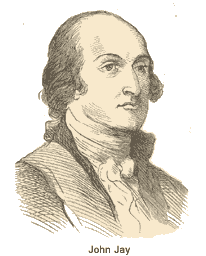John Jay was born in New York City, a descendant of French Huguenots. He was educated at King's College (now Columbia University) and gained a reputation as an able member of the local committee of correspondence.
Jay served in the First Continental Congress in 1774, the Second Continental Congress in 1775-75, and in the New York Convention after war had broken out. He played a prominent role in drafting the new New York constitution and was appointed chief justice of the New York Supreme Court in 1777.
 In 1780, Jay undertook the first of his diplomatic assignments as minister to Spain. He joined John Adams and Benjamin Franklin in negotiating the Peace of Paris (1783) to end the War of Independence. Jay served as the secretary of foreign affairs under the Articles of Confederation government.
In 1780, Jay undertook the first of his diplomatic assignments as minister to Spain. He joined John Adams and Benjamin Franklin in negotiating the Peace of Paris (1783) to end the War of Independence. Jay served as the secretary of foreign affairs under the Articles of Confederation government.
Jay favored the adoption of the new Constitution and played a minor role in writing The Federalist Papers with Madison and Hamilton. In 1788, Jay was again a delegate in the New York Convention, which narrowly ratified the Constitution.
In 1789, Jay was appointed the first Chief Justice of the U.S. Supreme Court. In 1792, he ran unsuccessfully for the governorship of his home state. Jay traveled to England in 1794, to negotiate what came to known as Jay's Treaty, a widely unpopular agreement with the former mother country.
Jay's remarkably productive public career ended with the governorship of New York from 1795 to 1801.